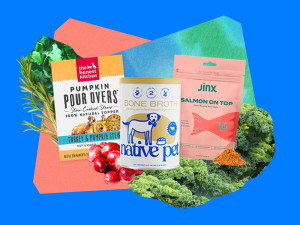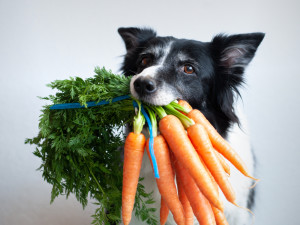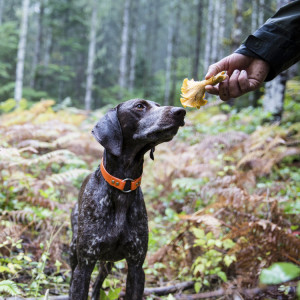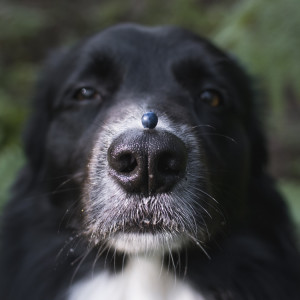Can Dogs Eat Avocado?
Hold the avo toast, please.
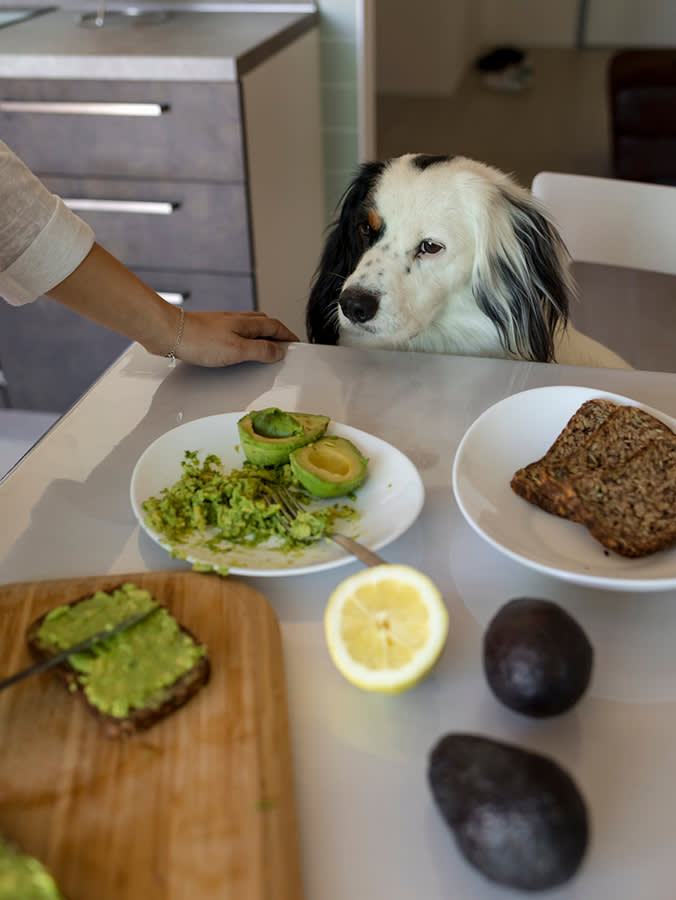
share article
If it seems like everywhere you eat, avocado is on the menu, you are not mistaken. Avocado is the superfood of our generation, and it seems to be around way more than ever before, even if it does cost — as Chipotle likes to remind you every time you order a burrito bowl with guac — extra.
A big reason for the spike in its popularity are all the health benefits packed into that cute little green package. We are all so used to thinking of avocado as a great addition to any meal, so you may have thought about giving some to your pup, too. But before you blend up that avocado and kibble smoothie for your pup, read on. While it may not be a serious toxin for most dogs, it should not be part of their regular diet, either.
What Is Avocado?
Avocados are the fruit of a tree called Persea americana, which grows in hot, tropical climates around the world. The fruits have a dark-colored, bumpy skin covering a soft, light-green flesh. They usually have a very large, round pit in the center. Avocados become soft and creamy when ripe, and if you’ve ever bought a ripe avocado and waited to eat it, you know that the window of soft rich perfection is very short. They quickly go from ripe to rotten if they sit around a few seconds too long. Avocados have become a superfood, beloved for their amazing nutritional contents and mild flavor. They have lots of fiber, vitamins, potassium, magnesium, and monounsaturated fat, which is a very healthy form of fat.
Are any parts of the avocado safe for dogs?
Avocado is considered to have low toxicityopens in a new tab for dogs, but it can be very toxic to other animals, including birds, horses, goats, and rabbits, so it is important to be cautious about who you share your guacamole with. The toxic component of avocados is called persin, and persin is found in all parts of the plant, including the leaves, fruit, and pits. No parts of the plant are completely safe, but a very small amount of the flesh of an avocado probably won’t have any effect on your pup. Just make sure to keep the portions small and keep the avo away from any other animals who may be more sensitive to the effects.
What are some dog-friendly alternatives to avocados?
Because avocados can cause mild tummy upset in dogs, including vomiting and/or diarrhea, why chance it and waste a perfectly ripe avocado on your pooch? If you are looking for ways to give your dog a nutritional boost, there are many safe foods opens in a new tab that can provide positive benefits. Your dog’s main source of nutrition should always be a dog food diet that is complete and balancedopens in a new tab to provide all of its necessary nutrition. If you want to add a little something special, here are some safe choices. Just be sure to keep your dog’s total caloric intakeopens in a new tab in mind if you are adding some of these foods to their diet so you don’t unintentionally overfeed your pup and risk unhealthy weight gain.
What are the risks of dogs eating avocado?
There are three main risks to consider if a dog eats avocado. The first is the possible toxicity from persin, which is found throughout the plant. The second is the risk of a blockage in the digestive tract if your dog eats the avocado pit. The third is the risk of any other toxinsopens in a new tab that may have been mixed in with the avocado if it was prepared as part of a bigger recipe.
Persin
Persin is a compound found in all parts of the avocado plant, including the leaves, skin, fruit, and pit. For dogs, it is considered a low-level toxin, meaning that it is very unlikely to have serious side effects unless they ingest a large amount of it. In most cases, ingesting small amounts can cause vomiting and/or diarrhea, and most signs will resolve without medical intervention.
In the veterinary community, there is a well-known caseopens in a new tab of two dogs that died on an avocado farm in Kenya, and they were suspected to have had persin poisoning from eating large amounts of avocado plants. This is the only known case of death from possible avocado ingestion, and they were not directly observed eating the plants, so it’s possible they ingested another toxin as well. Theoretically, they could have eaten a very large amount of avocados because they had unlimited access to it. Again, it is important to note that persin is very toxic to many other animals, including rabbits, birds, horses, and goats, so they should never be fed avocado or any part of the plant.
Intestinal Obstruction
The large, smooth, round pit inside of an avocado looks like it could be a perfect ball to use for a game of fetch, but beware, these pits are small and slippery and could be swallowed unintentionally, or sometimes intentionally. The pit of an avocado is just the right size to be small enough to swallow, yet too big to pass through the narrower parts of the intestine during digestion. If it gets stuck along the way, this causes a blockage where nothing can pass through the digestive tract, making your dog feel very sick and potentially causing a lot of damage to the stomach and/or intestines.
Signs of a blockage include nausea, vomiting, not eating, a painful belly, and general lethargy and dehydration. This is considered a medical emergency that usually requires immediate surgery. The sooner the condition is diagnosed and treated, the better the chance of a full recovery; dogs get sicker and the damage to their intestines gets worse the longer the blockage is there.
Other Toxins
If your dog ingested avocado as part of a prepared food, it is important to think about what other ingredients may have been in there and if any of those pose a risk to your pup. For example, when avocado is used to make guacamole, it is often combined with garlic and/or onions, which can be toxic to dogs. If you are unsure whether or not certain ingredients are safe for dogsopens in a new tab, contact a pet-poison hotline to find out.
What should I do if my dog eats avocado?
If your dog gets a small bite or lick of avocado, it is not a major concern, and most dogs will be just fine after ingesting small amounts. If you are seeing vomitingopens in a new tab, diarrheaopens in a new tab, or any other concerning signs, be sure to contact your veterinarian. Most signs resolve without treatment, but it is important to seek out care if your dog is not eating and/or seems lethargic because they can become dehydrated in those cases. They also might have another cause for their tummy troubles, and the avocado ingestion was just a timely coincidence. If you think your dog ate a large quantity of avocado and/or may have swallowed an avocado pit, contact your veterinarian immediately. Consider calling a pet-poison hotline for additional recommendations, too.
Are there any benefits to feeding avocados to dogs?
Avocados are chock full of nutrients that can provide many health benefits, but given the concern that eating large amounts of avocado can make dogs sick, it is best not to include it in your pup’s regular diet. The good news is that dog food is balanced to provide all of these important nutrients in just the right proportions, so they are already getting these as long as they eat a balanced diet. Many of the nutrients in avocado are also found in other foods that would be a safer choice for your pupopens in a new tab. These include:
Vitamins C, E, and K
These vitamins provide many health benefits in the body and can be found in many other foods that are safe for your dog including fruits, vegetables, and some nuts.
Fiber
Fiber will keep your dog on a regular poopopens in a new tab schedule and also has many added benefits for good gut health. Check out some other great sources of fiber for dogs listed above.
Healthy Fats
Healthy fats include monounsaturated and polyunsaturated fats. Avocados are high in monounsaturated fats. While the fruit itself may not be a great choice for your dog, oils extracted from avocado plants called unsaponifiablesopens in a new tab (ASUs) are potent anti-inflammatory agents and can be very useful in promoting healthy jointsopens in a new tab. They are found in many joint supplements for dogs.
Antioxidants
Antioxidants help protect cells against damage caused by free radicals. They are also found in many other fruits and vegetables that are safe for your dog to snack on.
A creamy, ripe avocado can be hard to resist, especially when you know it’s actually very good for youopens in a new tab. While it may be tempting to want to share this glorious superfood with your dog, it’s best to save the avocado for yourself and treat your dog to other safe snacks. There are so many fruits and vegetables that will be equally delicious, healthy, and less likely to result in a 3 a.m. wake-up call when your dog pukes on your bed.
FAQ (People Also Ask:
1) What are the risks of dogs eating avocado?
Avocados contain persin, which can cause vomiting and diarrhea in dogs. The pit can also pose a risk if swallowed as it can cause an intestinal blockage. Some foods containing avocado may have other ingredients that are toxic to dogs as well.
2) Are any parts of the avocado safe for dogs?
All parts of the avocado plant contain persin, including the leaves, fruit, and skin. Because the risk of serious side effects is low, it would not be a major concern if a dog ate a bite of avocado, but they should not eat large amounts or have it as part of their regular diet.
3) Can dogs have avocado oil or avocado-based products?
Some avocado-based products are safe for dogs if they do not contain persin. For example, oils extracted from avocado plants called unsaponifiables (ASUs) are potent anti-inflammatory agents and can be very useful in promoting healthy joints. They are found in many joint supplementsopens in a new tab for dogs. Other avocado oils that are free from persin would also be safe for dogs in small amounts. It is always a good idea to double-check any product you purchase and make sure all the ingredients are non-toxic for your pup.
4) What are the benefits of feeding avocados to dogs?
Avocados contain many beneficial nutrients including vitamins C, E, and K, as well as fiber, healthy fats, and potassium. While it is not recommended to feed avocado to dogs, they can get these benefits from many other safe food sources including fruits, vegetables, lean meats, and fish.
5) What should I do if my dog eats avocado?
If your dog eats a small amount of avocado, they will likely be fine. If you are concerned that your dog ate a lot of avocado, especially if they might have swallowed the pit, contact your vet right away as well as a pet-poison hotline.
6) What are some dog-friendly alternatives to avocados?
There are many fruits and vegetables that can provide similar benefits to avocados and are safer choices for dogs. Depending on what nutrients you are hoping to target, you can try different ingredients as a complement to your dog’s primary diet, as long as you check that they are non-toxic for dogs. It is most important to ensure your dog is eating a dog-food diet that is complete and balanced for daily nutrition because this confirms your dog is getting all of the nutrients it needs in the right proportions.
Resources

Dr. Amy Fox, DVM
Amy Fox, DVM is a small animal veterinarian in New York City. A lifelong animal lover, Dr. Fox studied biology in college and then worked as a veterinary nurse before pursuing veterinary school at Cornell University. She has worked in many different settings including shelter medicine, emergency medicine, general practice, and animal cruelty and forensics. She is especially interested in nutrition, preventative medicine and care for senior pets. Dr. Fox also enjoys writing about veterinary medicine and teaching. In her free time she loves to cook, garden, and go for long runs.
Related articles
![brown dog begging for food at table]() opens in a new tab
opens in a new tabHuman Foods Toxic to Dogs — From A-Z
Even if they ain’t too proud to beg…
![A dog sniffing a mushroom out of a hand.]() opens in a new tab
opens in a new tab6 Mushroom Superfoods that Won’t Turn Your Dog Into a Zombie
Nothing to fear here The Last of Us fans — ’shrooms are great immune-boosters.
![Puppy eating a bowl of blueberries]() opens in a new tab
opens in a new tab10 Superfoods to Share With Your Dog
From kale to quinoa, these nutrient-packed picks deserve a spot in your dog’s food bowl.
![A close up view of a dog with a blueberry resting on its nose]() opens in a new tab
opens in a new tabCan Dogs Eat Blueberries?
Yep — blueberries are a fiber and antioxidant-packed snack for your pup.
![pet parents making homemade dog food cheaper for black dog climbing on counter]() opens in a new tab
opens in a new tabIs Cooking Your Dog’s Food Worth it?
A nutritionist on dogs’ unique dietary needs, important ingredients, and other pro tips for home-cooked dog food.
![two people preparing food for their dogs]() opens in a new tab
opens in a new tabAre Celebrity Chefs Feeding Their Pets Five-Star Meals?
These expert-approved recipes will help you use all the food in your kitchen.




